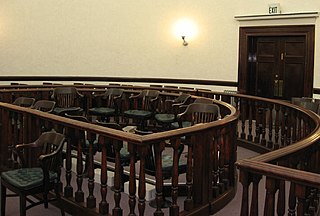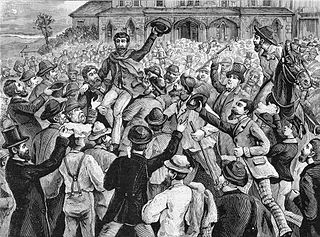In jurisprudence, double jeopardy is a procedural defence that prevents an accused person from being tried again on the same charges following an acquittal or conviction and in rare cases prosecutorial and/or judge misconduct in the same jurisdiction. Double jeopardy is a common concept in criminal law. In civil law, a similar concept is that of res judicata. Variation in common law countries is the peremptory plea, which may take the specific forms of autrefois acquit or autrefois convict. These doctrines appear to have originated in ancient Roman law, in the broader principle non bis in idem.

A jury trial, or trial by jury, is a legal proceeding in which a jury makes a decision or findings of fact. It is distinguished from a bench trial in which a judge or panel of judges makes all decisions.

A jury is a sworn body of people (jurors) convened to hear evidence and render an impartial verdict officially submitted to them by a court, or to set a penalty or judgment.

In common law jurisdictions, an acquittal means that the prosecution has failed to prove that the accused is guilty beyond a reasonable doubt of the charge presented. It certifies that the accused is free from the charge of an offense, as far as criminal law is concerned. The finality of an acquittal is dependent on the jurisdiction. In some countries, such as the United States, an acquittal prohibits the retrial of the accused for the same offense, even if new evidence surfaces that further implicates the accused. The effect of an acquittal on criminal proceedings is the same whether it results from a jury verdict or results from the operation of some other rule that discharges the accused. In other countries,[which?] like Australia and the UK, the prosecuting authority may appeal an acquittal similar to how a defendant may appeal a conviction — but usually only if new and compelling evidence comes to light or the accused has interfered with or intimidated a juror or witness.
A hung jury, also called a deadlocked jury, is a judicial jury that cannot agree upon a verdict after extended deliberation and is unable to reach the required unanimity or supermajority. Hung juries usually result in the case being tried again.
Fong Foo v. United States, 369 U.S. 141 (1962), was a Supreme Court ruling that upheld the protection from double jeopardy by the federal government. While the protection from double jeopardy did not get incorporated to apply to the state governments until 1969, the Supreme Court ruled that the Fifth Amendment to the United States Constitution prevented the Federal Government from bringing a defendant to trial twice for the same charge. In this case, the court ruled that despite the error of the District Judge, the 5th Amendment protected the defendants from facing a second trial for the same charge.
Ex parte Bigelow, 113 U.S. 328 (1885), was an application for a writ of habeas corpus to release the petitioner from imprisonment in the District of Columbia jail where he was held, as he alleges, unlawfully by John S. Crocker, the warden of the jail. He presents with the petition the record of his conviction and sentence in the Supreme Court of the District to imprisonment for five years under an indictment for embezzlement, and this record and the petition of the applicant present all that could be brought before the court on a return to the writ, if one were awarded.
The Double Jeopardy Clause of the Fifth Amendment to the United States Constitution provides: "[N]or shall any person be subject for the same offence to be twice put in jeopardy of life or limb..." The four essential protections included are prohibitions against, for the same offense:
A citizen’s right to a trial by jury is a central feature of the United States Constitution. It is considered a fundamental principle of the American legal system.
United States v. Dinitz, 424 U.S. 600 (1976), was a case in which the Supreme Court of the United States determined that the U.S. Const., Amend. V protection against double jeopardy did not prevent a retrial of a defendant, who had previously requested a mistrial.
Ludwig v. Massachusetts, 427 U.S. 618 (1976), was a case in which the Supreme Court of the United States held that the Massachusetts two-tier court system did not deprive Ludwig of his U.S. Const., Amend. XIV right to a jury trial and did not violate the double jeopardy clause of the U.S. Const., Amend. V.

The Marshall Court (1801–1835) heard forty-one criminal law cases, slightly more than one per year. Among such cases are United States v. Simms (1803), United States v. More (1805), Ex parte Bollman (1807), United States v. Hudson (1812), Cohens v. Virginia (1821), United States v. Perez (1824), Worcester v. Georgia (1832), and United States v. Wilson (1833).
United States v. Jackalow, 66 U.S. 484 (1862), is a U.S. Supreme Court case interpreting the Venue and Vicinage clauses of the United States Constitution. It was an "unusual criminal case" and one of the few constitutional criminal cases from the Taney Court. Jackalow, a mariner from the Ryukyu Kingdom, was suspected of the robbery and murder of the captain of the sloop Spray, Jonathan Leete, and Jonathan's brother Elijah, while the ship was at sea. He was convicted of robbery in the Long Island Sound, but as there was disagreement over the question of jurisdiction between the two judges who heard the post-trial motion, the case was referred to the Supreme Court by certificate of division.
Dietz v. Bouldin, 579 U.S. ___ (2016), was a United States Supreme Court case in which the Court held that a federal district court may rescind a discharge order and recall jurors for further service in the same case.
Blueford v. Arkansas, 566 U.S. 599 (2012), was a decision of the Supreme Court of the United States that clarified the limits of the Double Jeopardy Clause. The Supreme Court held that the Double Jeopardy Clause does not bar retrial of counts that a jury had previously unanimously voted to acquit on, when a mistrial is declared after the jury deadlocked on a lesser included offense.
Burks v. United States, 437 U.S. 1 (1978), is a United States Supreme Court decision that clarified both the scope of the protection against double jeopardy provided by the Fifth Amendment to the United States Constitution and the limits of an appellate court's discretion to fashion a remedy under section 2106 of Title 28 to the United States Code. It established the constitutional rule that where an appellate court reverses a criminal conviction on the ground that the prosecution failed to present sufficient evidence to prove the defendant's guilt beyond a reasonable doubt, the Double Jeopardy Clause shields the defendant from a second prosecution for the same offense. Notwithstanding the power that appellate courts have under section 2106 to "remand the cause and direct the entry of such appropriate judgment, decree, or order, or require such further proceedings to be had as may be just under the circumstances," a court that reverses a conviction for insufficiency of the evidence may not allow the lower court a choice on remand between acquitting the defendant and ordering a new trial. The "only 'just' remedy" in this situation, the Court held, is to order an acquittal.
United States v. Jorn, 400 U.S. 470 (1971), was a United States Supreme Court decision clarifying when a criminal defendant may be retried after a mistrial. In this case, where a trial judge abruptly declared a mistrial to prevent the prosecution's witness from incriminating himself, a second trial was barred by the Double Jeopardy Clause.
United States v. 422 Casks of Wine, 26 U.S. 547 (1828), is an 1828 United States Supreme Court civil forfeiture case between the United States and 422 casks of Malaga wine. The case was brought after the United States moved to seize the wine on the grounds that it had been deliberately mislabeled as sherry to get a tax drawback, and the buyers objected. The original trial was ruled in favor of the United States but was ordered to be retried after errors were discovered concerning jurisdiction. In the subsequent retrial, the Supreme Court ruled against the United States; however, they did grant them a certificate of seizure on probable cause.
Ramos v. Louisiana, 590 U.S. ___ (2020), was a U.S. Supreme Court decision in which the Court ruled that the Sixth Amendment to the U.S. Constitution requires that guilty verdicts be unanimous in trials for serious crimes. Only cases in Oregon and Louisiana were affected by the ruling because every other state already had this requirement. The decision incorporated the Sixth Amendment requirement for unanimous jury criminal convictions against the states, and thereby overturned the Court's previous decision from the 1972 cases Apodaca v. Oregon and Johnson v. Louisiana.




